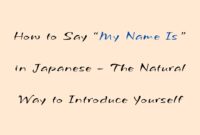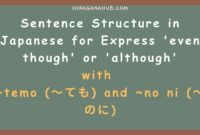Mastering Positive Adjectives in Japanese: A Comprehensive Guide
Learning Japanese can be an enjoyable and rewarding experience. One
essential aspect of mastering the language is understanding
adjectives (けいようし). This article delves into
positive adjectives in Japanese, focusing on the sentence pattern
“Noun + は (wa) + adjective (な)/(い) + です (desu)”. Let’s get
started!
Understanding the Sentence Pattern “Noun + は + Adjective (な)/(い) +
です”
In Japanese, to describe something about a noun or a person, we often
use this pattern. The noun is followed by the particle
は (wa), then an adjective ending with
-な or -い, and concluded with
です (desu), which means “is” or “are”.
Structure Example:
- Noun + は + Adjective + です
This pattern is incredibly useful for clearly and simply describing
the state or qualities of something.

Example Sentences with -な Adjectives
Here are three example sentences using adjectives ending with
-な:
-
がっこうはしずかです (Gakkou wa shizuka desu): The school is quiet.
-
へやはきれいです (Heya wa kirei desu): The room is clean.
-
ともだちはしんせつです (Tomodachi wa shinsetsu desu): The friend is kind.
Example Sentences with -い Adjectives
Here are three example sentences using adjectives ending with
-い:
- てんきはよいです (Tenki wa yoi desu): The weather is good.
- ほんはおもしろいです (Hon wa omoshiroi desu): The book is interesting.
- えいがはながいです (Eiga wa nagai desu): The movie is long.
Vocabulary List Used
Below is the list of vocabulary from the example sentences:
| Hiragana | Romaji | Meaning |
|---|---|---|
| がっこう | gakkō | school |
| しずか | shizuka | quiet |
| へや | heya | room |
| きれい | kirei | clean |
| ともだち | tomodachi | friend |
| しんせつ | shinsetsu | kind |
| てんき | tenki | weather |
| よい | yoi | good |
| ほん | hon | book |
| おもしろい | omoshiroi | interesting |
| えいが | eiga | movie |
| ながい | nagai | long |
Read other lesson:
- How to Change Japanese Verbs to the Te Form (Te-kei)
- The different meanings of ‘in’ in Japanese Particles “Ni” and “De” (に、で)
Tips for Learning Adjectives in Japanese
To deepen your understanding of adjectives in Japanese, here are some
tips you can try:
-
Take Online Courses: Many platforms offer
Japanese courses that are free,
allowing you to access lessons anytime. This flexibility makes
learning easier and more convenient. -
Use Language Learning Apps: Apps like Duolingo or
Memrise provide interactive lessons to expand
your vocabulary and grammar skills. -
Practice with Virtual Classes: Joining an
online class lets you interact directly with
instructors and fellow learners, enhancing your speaking abilities
and understanding of word meanings. -
Translate Sentences: Try translating sentences
from your native language to Japanese and vice versa. This
exercise helps you grasp how adjectives are used in different
contexts. -
Create Vocabulary Lists: Make lists of new
adjectives you learn along with their meanings. This practice aids
in memorization and application in daily conversations.
Mastering positive adjectives in Japanese is a crucial step in
enhancing your language skills. By understanding the sentence pattern
“Noun + は + Adjective (な)/(い) + です” and practicing with example
sentences, you can improve your fluency. Utilize
online resources, free courses, and
interactive lessons to support your learning journey.
Keep practicing, don’t hesitate to translate, and
always strive to understand the meaning of each word
to achieve your goal of mastering Japanese!


